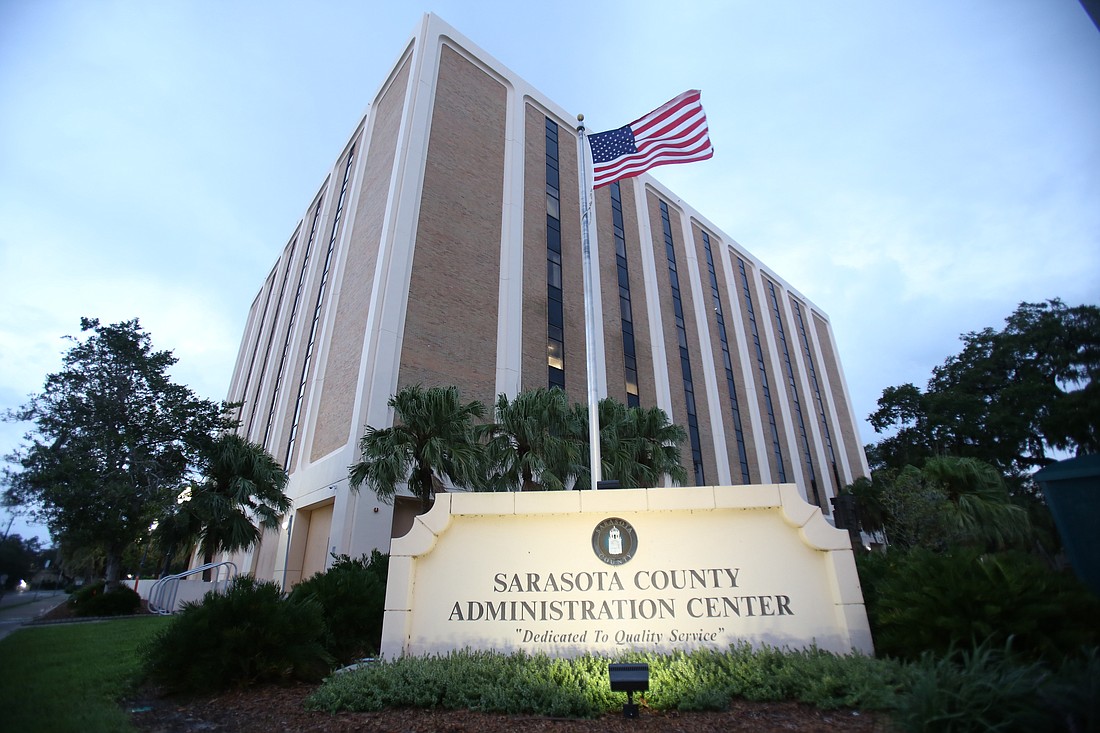- December 23, 2024
-
-
Loading

Loading
 File
File
The Sarasota County Commission has fully restored the county’s portion of funding to the Economic Development Corp. of Sarasota County for the next fiscal year, with conditions.
Among them: Show measurable, tangible results in one year or lose a large chunk of the county’s approximately $1 million contribution to the EDC’s annual budget.
With mixed reviews from the four commissioners, the long-running tenuous relationship between the EDC and county of years past was front and center during a May 9 meeting as they debated the merits of intangible benefits of the organization’s work against measurables demanded by commissioners Mike Moran and Joe Neunder.
The decision reverses, for now, a 2022 decision by the commission to reduce the county's contribution of revenue from business taxes only — approximately 44% of the total — to the EDC by one-third each year through 2025. For fiscal year 2023, that amounted to approximately $321,600, which, if eventually eliminated, would reduce the public funding by just less than one-third.

Public funding is projected at approximately $1.05 million of the EDC's $1.7 million fiscal year 2024 budget. That comes from local business tax, a per capita allocation and tourist development tax revenues. The remaining $656,500 will be raised privately through private investors, grants, events and other fundraising.
In making his motion to approve full county funding for next fiscal year, Neunder said, “The expectation for me is that you come back incrementally to report to us on your project. If I don't feel like there is measurable, quantifiable outcomes next year, I'll be the first person to make a motion to deny the funding.”
Neunder's motion passed 3-1. Moran dissented.
Although they acknowledged much of the animosity between the commission and the EDC is long in the past — the organization has a reconstituted board of directors, new staff and a new leadership — the objection to funding the EDC remains the same in that, according to Moran, it has failed to demonstrate return on investment.
Erin Silk, recently named by the EDC board to succeed interim Executive Director Lisa Krouse, countered that much of the EDC’s work is intangible, that corporate recruiting efforts typically take years to be quantifiable and that this next-generation EDC is making strides to meet the county’s expectations. Those include closing in on balanced financial support from government and private philanthropy.
“When I stepped into a leadership role with Lisa 18 months ago, our budget was 20% from private sources,” Silk said. “Today as we look toward the end of 2023, we’re close to 40% in private funding. I am committed to continue moving this ratio closer to 50-50.”
Of the $1.07 million public portion of the EDC’s budget, 44% comes from the county’s business tax and 20% from its per capita contribution.
Since 2009, the EDC has received $14.4 million in public funding, averaging about $1 million per year. The only year-over-year increase during that time, Silk told commissioners, is in the per capita contribution as the population grew. For that investment, she attempted to offer commissioners some tangible data.
“Since we implemented (a) Salesforce CRM tracking system in 2019, the organization has received $4.2 million in public funding,” she said. “Of the business expansion and relocations we contributed to, they reported over $58 million in capital investment, 1,200 projected new jobs, almost $60 million in new yearly payroll, and the local taxing entities will collect $6 million over the next 10 years alone from those projects.”
Moran and other commissioners repeatedly pointed out that their concerns are not directed at Silk or the new board, but contended they had heard the same arguments from the EDC for years.
“I feel like I'm in 'Groundhog Day' with this because a lot of these conversations are literally the same wording coming full circle all the way back to six years ago,” Moran said.
Silk said losing the funding would severely curtail the EDC’s activities, particularly its core mission of business recruiting.
“Our aggressive marketing programs and our business park initiative will no longer be an option for us,” she said. "We will only have the resources to address the incoming requests for service, and I believe our community deserves an economic development plan that aggressively chases down the diverse projects we want rather than sits around and waits for them to come to us.”
It appeared through the discussion that a vote to further reduce EDC funding would be deadlocked at 2-2 before Commission Chairman Ron Cutsinger, who is the commission’s representative on the EDC board, stepped in to describe it as a new EDC building a stronger relationship with the business community and local governments.
“Ask the business community do they support this? I've asked as many people as I can to tell me about your thoughts about the EDC,” Cutsinger said. “I've had everyone say to me, this is a new EDC and we're very excited about it. We support it. I'm concerned that perhaps we're moving into a time of lower economic activity, but I think it's important to continue driving forward with diversifying our economy and I think the EDC is a huge help and bringing companies that are year-round, high-paying jobs that will help through a time of slower economic activity when you have not as much tourism, not as much construction and other things that we normally rely on.”
The article has been updated throughout with additional comments from county commissioners and EDC Executive Director Erin Silk.